Black Friday Special: 2013
The idea here was to follow up Thanksgiving's traditional Turkey
Shoot, with its takedown of the year's most overrated records, with
a selection of lesser-known, underappreciated albums. One thing I
noticed from last year was that some critics had no real interest
in searching out bad music, or perhaps in even writing negative
reviews. I actually think that's the norm for critics: they get
into writing about music because they've found music they think
is worth writing about -- promoting, even. I know I never looked
forward for Christgau's Turkey Shoots: mostly they confirm your
suspicions, occasionally dashing hopes, once in a while provoking
disagreement, while offering nothing more. So this seemed like
the right way to balance out the negativity. And there seemed to
be a certain serendipity to the timing: most stores are closed
on Thanksgiving day, while the day after -- not sure why it's
called Black Friday since it seems more purple to me -- is the
nominal start of the annual Christmas consumption orgy.
And this started off promisingly, with Lucas Fagen proposing
three records even I had never heard of -- I say "even" because
I've been maintaining a
metacritic file that
tries to track everything any critic notices, over 6,000 records
so far this year. And we did go on to attract a few critics who
had bypassed the Turkey Shoots. But we still wound up shorter
than the Turkey Shoot -- partly my fault, as I have lots of the
sort of records I was hoping for but couldn't find the time to
revisit them and expand my exceptionally cryptic reviews. And
I'll have a long post tomorrow where I'll offer my own takes on
some of yesterday's and today's records.
Thanks to all the contributors here, and also to Michael Tatum
and Dan Weiss for their editing help and inspiration.
 Balqees: Majnoun (Rotana)
Balqees: Majnoun (Rotana)
Singing in her local dialect with the enunciated clarity of the
educated upper-upper-middle-class, operating primarily in the
international-ballad mode that dominates radio east of the Atlantic,
Balqees Fathi is a Yemeni pop princess no more likely to embrace
social consciousness than Taylor Swift. Simply by virtue of the big
synthed-up production, however, this album is at once a conscious
statement and a glorious disco sellout. Bending such ballads onto a
cheesy, squiggly electrobeat, melding feverish guitar figures and
those high tacky keyboards mimicking flutes or violins or any
other instrument worth mimicking, she's turned lounge music into a
stylized, exoticized variant on hooky bubblegum, an explicitly gaudy
Westernization of standard issue Arabpop. Most likely this certified
kitsch masterpiece will never leave the Arab world. But as its plastic
orchestral tunes revel in their own fabulosity, they demonstrate how
bourgeois gentility can coexist with real energy and
passion.
A [LF]
 The Blind Boys of Alabama: I'll Find a Way (Masterworks)
The Blind Boys of Alabama: I'll Find a Way (Masterworks)
In the same year that Vampire Weekend released a surprisingly
God-focused album, these gospel greats have released the year's
greatest indie-folk album. With Justin Vernon handling the production
and a guest list that ranges from Shara Worden to Merrill Garbus, this
is a gorgeous album that never lets you forget that it's gospel, even
when the collaborators suggest otherwise. Vernon's production
proves that he's capable of creating good music and, although it may
be too mellow to top 2001's Spirit of the Century (I can't see
any of these tracks becoming the theme song to one of television's
greatest seasons), it's beautiful nonetheless.
A MINUS [MR]
 Cedric Burnside Project: Hear Me When I Say (self-released)
Cedric Burnside Project: Hear Me When I Say (self-released)
Little Walter articulated a fundamental with his hit "Blues with a
Feeling," since blues most certainly is a feeling, or perhaps, a
proper sound. Tone, texture and atmosphere were the essence of a
couple very late-period Delta bluesmen, both deceased, R.L. Burnside
and Junior Kimbrough. They acquired an indie-hipster fanbase that made
too much of their realness, their rawness, their downhome
awe-then-ti-cee while ignoring limitations of songwriting, vocals, and
repetitious performances. Even so, the tone, texture and atmosphere
sliced right to the blues center and about half the time, so does the
latest from R.L. Burnside's grandson, drummer/songwriter/singer Cedric
Burnside, here accompanied by bassist and guitarist Trent
Ayers. Burnside's feel for the beats -- blues drumming is perennially
slighted -- makes you forget clichéd words and non-arrangements on
numbers like "Bloodstone," "Tight Tight," and (natch) "Gettin' Funky."
And to get them out of the way, the ballads are putrid and will always
be skipped. Hear Me When I Say is for blues hounds, yes, but they're
the ones who thirst for that feeling most.
B PLUS [MM]
 Ezra Furman: Day of the Dog (Bar/None)
Ezra Furman: Day of the Dog (Bar/None)
An already gifted singer-songwriter, this is a huge improvement on
last year's The Year of No Returning where the tracks
ranged from faux-Dylan to faux-Neil Young. He punches this album
up with rhythm & blues piano and horns, though, and much like
Low Cut Connie, he shows that early rock and roll sounds aren't
still work. After all, punk rock has always thrilled with the freedom
of explicitness. When set to crunching guitars and heavy drums, a line
like "I wanna destroy something/I wanna destroy myself" might sound
like a wannabe Sex Pistols track. Here, it sounds like a song that
Jerry Lee Lewis was never allowed to release. Throughout the album,
everything from a Bo Diddley rhythm ("At the Bottom of the Ocean") to
rockabilly ("Tell Em All to Go to Hell") is used to create a
fascinating mood that juxtaposes perfectly with the dark lyrics. With
the way he changes it up with each album, I personally can't see wait
to see what he goes for next.
A MINUS [MR]
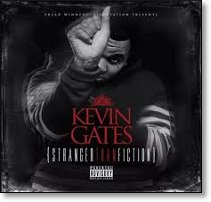 Kevin Gates: Stranger Than Fiction (Bread Winners Association)
Kevin Gates: Stranger Than Fiction (Bread Winners Association)
"My life a movie," Gates raps after being shot at by a friend he may
or may not have later killed. His previous mixtape's name, The Luca
Brasi Story, lets us conclude, with some relief, the movie isn't
Scarface. Like Marshall Mathers (a Luca Brasi title),
Gates has character actor technique, and what he lacks in star power
he makes up for in commitment to his role. Unlike Em, he never uses
his range of voices to avoid implicating himself. Instead, his redneck
twang ("Careful") and fake patois ("Tiger") illustrate the multitudes
in his interior life -- amidst the bullets and programmed orchestras,
he's loyal, introverted, needy. "The worst thing you can give any
nigga or bitch is rejection," he says, before denouncing men who crave
the attention of other men as hoes. He's working on the border between
masculine and feminine codes, dangerous territory for a rapper. Gates
isn't worried about sleeping with the fishes. He's worried about
ending up as alone as Michael Corleone.
A MINUS [BL]
 G-Dragon: Coup d'Etat (YG)
G-Dragon: Coup d'Etat (YG)
Boy band buffs should start with Big Bang's Alive EP, in which
G-Dragon, the guy with the abs, and the other three smoldered as
consistently as any millennial Max Martin troupe. Aficionados of all
things cray might begin with last year's One of a Kind EP, in
which GD proved his rap bona fides by bragging about his looks like
peak Missy working it. This, his play for global stardom, enlisted
enough B-list brand names -- Sky Ferreira! Baauer! -- for a
celebrities-in-Seoul reality show pilot. Appropriating American sounds
(chief beatmaker Teddy can fake anything from pop dubstep to Blood
Orange) and language (guap guap guap) without scruple, all he got for
his efforts was a Complex Magazine digital cover and a U.S. #161
album. He'll never be a trans-Pacific star even after he passes his
TOEFL. Off-peak Missy shows up and cuts him, and he lacks the
expressive range to become a go-to foreign weirdo like Robyn. But top
40 listeners who realize they deserve better than 2013 Timberlake
should try "Crooked," in which he gets over a broken pinky promise by
rocking eyeliner and a whole can of hairspray.
A MINUS [BL]
 Glasser: Interiors (True Panther Sounds)
Glasser: Interiors (True Panther Sounds)
I shouldn't like anything at all about Cameron Mesirow, who performs
under the name Glasser (there's a turn-off right there). On stage she
wears a lot of masks and is accompanied by a dance troupe called Body
City. She composes her music alone in a room and is about as un-band
as you can get (four other people play on her current album, but you'd
never know it). I like exactly one verse of her lyrics: "Remember when
we went through/That dream when I came to you/And we held each other
on a trash pile/And we thought it odd/But we knew it was ours." As for
the rest, when they aren't tolerable puzzlements, they belong on that
pile. Her father, Jeff Mesirow, is a member of the Blue Man Group
('Nuf said -- but said very archly). Her mother played in an all-kazoo
outfit called Kazoontheit before founding Human Sexual Response, an
'80s local band I've always wanted to like a lot more than I've been
able to. And yet for weeks I compulsively played and replayed her
recent second album, Interiors, even when my conscious
intention was to slip on something much ruder and
earthier. Interiors was produced by Van Rivers of Sweden, who
also did the deed for Fever Ray, which may explain the
irresistible undertow-flow of the Glasser album. Even the performers
who she evokes to me, Björk and tUnE-yArDs, are far more committed to
the thwack of rhythm and seduced by the hook phrase. In the case of
Glasser anyway, the techno pulse can be subtle and rock your
bones. Her words and music are as snug and in love with each other as
it gets, turned out with enough assurance and certainty that I don't
mind never stopping to parse what she's singing. I got over any
misgivings about this after I checked out the new release by Juana
Molina of Argentina. Although she's more ambient and clearly
playful/funny than Glasser, for the last 10 years Molina's antic music
mechanisms have swept me away and I can't understand a word. May
Glasser beat the odds with my ears for as long.
B PLUS [MM]
 King DJ: Let Me See You Feel (Bear Funk)
King DJ: Let Me See You Feel (Bear Funk)
Most Eurotronica aspires toward a midpoint between ironically archaic
kitsch and avant-garde ambience, directed at aesthetes who don't care
if their music is anonymous as long as it provides that legendary
rapture. Kristof Michiels has a more obtrusive sound in
mind. Sharpening the edges, making the beats buzz and pulsate and
tingle, winding up the rhythms so tightly they detonate on the double,
Michiels essays a giant hook monster complete with farting basslines
and rubberized synthesizer. Never let it be said that a drum machine
can't look discreetly over and give you a sly wink. Or a warm pat on
the back. Or a punch in the face.
A [LF]
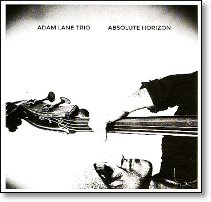 Adam Lane Trio: Absolute Horizon (NoBusiness)
Adam Lane Trio: Absolute Horizon (NoBusiness)
In hindsight, it was no surprise that bassist Adam Lane and
saxophonist Darius Jones would work together. They share a common
musical language and have similar approaches to modern jazz. Both tend
to write solid themes that they use as frameworks for their music, and
they seemingly draw inspiration from some of the same sources. For
each of them, this has resulted in music that leans avant, for sure,
but also swings and grooves. The two have joined forces on record to
great effect previously, notably on Jones' brash and swaggering
sophomore outing, Big Gurl (Smell My Dream). I say previously,
only this was recorded the summer before the February, 2011 session
that spawned Big Gurl. With Lane's and Jones' knack for
composition in mind, it's perhaps a bit of a surprise that Absolute
Horizon is a wholly improvised effort. Yet the trio, with Vijay
Anderson joining in on drums, find common ground so effortlessly here,
you'd be excused to think these guys had been playing together for a
long time or at least wrote out large parts of this before hitting
record. On this thrilling album, some of that rough blues, the funk
tinged grooves, the post 60s avant jazz and sonic boldness that have
been prominent on both Lane's and Jones' other albums meld with
probing stretches that straddle skronk, and sweeping
atmospherics. Lane alternates assertive bass ostinati with driving
runs, Jones' alto cries, honks and soars, while Anderson's loose swing
assures propulsion. Thematic fragments and melodic strains intersect
at seemingly just the right moments, underpinned by determined
grooves. Nowhere is their approach more successful than on the epic
"The Great Glass Elevator," which goes from a plaintive cry to a
joyous, dancing finale at he drop of a few bass notes from Lane. The
knowledge that these pieces were fully improvised, makes such feats
seem even more impressive, but the music on Absolute Horizon is
powerful and engaging regardless of how it was contrived.
A [CM]
 Revolutionary Ensemble: Counterparts (Mutable)
Revolutionary Ensemble: Counterparts (Mutable)
This is from 2005 -- the trio's last concert performance, in Genoa two
years before violinist Leroy Jenkins's death and four years before
bassist Sirone's -- but it was released only this spring, and I swear
it's more vital than almost anything else I've heard in 2013. An apt
comparison might be the Modern Jazz Quartet, except that the
instrumentation is sparser (violin in place of piano and vibes) and
what was permissible in the name of either jazz or classical, or in
the name of both, had changed drastically by this group's formation in
1972. Though recognizably jazz (Sirone's title opener and Jenkins's
"Berlin Ertarhung" are as close to swingers as anything these three
ever recorded, and Jenkins's "Rumi Tales" and "Usami" are ballads in
more than tempo), this music is post-Webern as well as post-Parker, on
the outskirts of microtonality when not forthrightly
microtonal. Jenkins was the first violin virtuoso to go free; and he's
in top form here, the instrument's noble romanticism always within
reach, whether embraced or mocked. On "Fulfillment," the collectively
improvised closer, there are stretches where it sounds like he's
bowing furiously after detuning his strings or removing them
altogether, though more likely he's just rubbing or striking his bow
against the instrument's pegbox and C-bouts -- whatever, it's a
masterful display of extended techniques. When not propelling things
forward with a low rumble or the barest semblance of a bass walk,
Sirone is the violinist's keening string twin. And Jerome Cooper is as
much a one-man-band here as on his solo-percussion albums, not just
supplying color on traps but greatly expanding the palette with
bell-like balaphone, chiramia (a Mexican double-reed) and
electric-keyboard washes that are never just backdrops; at 16 minutes,
his piece "My Birds" is the CD's lengthiest piece but also the most
tonally varied and finely developed. Now, if only someone would
reissue The People's Republic, the RE's long-lost 1975 A&M
studio LP, and finally get around to recording the music from
Jenkins's three forgotten theatrical collaborations with librettist
Ann T. Greene, even though it would now have to be without him.
A [FD]
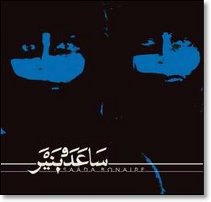 Saâda Bonaire: Saâda Bonaire (1982-85, Captured Tracks)
Saâda Bonaire: Saâda Bonaire (1982-85, Captured Tracks)
German disco group, Bremen DJ Ralph von Richtoven and singer Stephanie
Lange with Claudia Hossfeld in on the group's only single and Dennis
Bovell producing. This scrounges up more than an hour of material,
the stiff retro beats flecked with exotic spices, spots of oud and
saz and hand drums played by Turkish immigrants. Lange's English is
a bit stilted, her voice dusky -- reminds me of an earlier German
disco group, Silver Convention, only with the carefree 1970s swish
driven discreetly underground.
A MINUS [TH]
 Boz Scaggs: Memphis (429 Records)
Boz Scaggs: Memphis (429 Records)
Sage geezers know there are really only two ways you can go when you
make an all-covers record. Johnny Cash owns the brand on the one
kind -- the stoned-parlor-game kind which promises poignant and/or
hilarious pairing of familiar artist and unexpected material. The
other, much more common kind is the repertoire record, and these live
or die on the margins: a surprising and welcome song choice here and
there, vocal chops you didn't expect at this late date -- like
that. It was a pretty good year for this type, with some choice cuts
coming from Matthew Sweet and Susannah Hoffs, Tommy Keene, Aaron
Neville, and Randy Travis, with his crushing confessional take on "I'm
Always on a Mountain When I Fall." The lovely Memphis clearly falls
into the repertoire camp, but with just enough of a difference to make
a difference. Of course Boz doesn't cover "Empire State of Mind" but
instead he winks at the young folks with his take on "Love on a Two
Way Street" and gooses the old folks with his musical relocating of
"Pearl of the Quarter." Also, Boz knows that if you are going to cover
Al Green it better be with a choice this unobvious ("So Good to Be
Here") and that damn right Willy DeVille deserves both of the spots he
gets here (with the triumphant lead-off cut "Mixed Up, Shook Up Girl"
and the DeVille-associated "Cadillac Walk"). Also, he hires Ray
Parker, Jr. to play guitar.
A MINUS [JM]
 Shinee: Dream Girl: The Misconceptions of You (SM Entertainment)
Shinee: Dream Girl: The Misconceptions of You (SM Entertainment)
This South Korean boy band has released at least three worthy albums
this year, including the spooky sequel Why So Serious? The
Misconceptions of Me and the more chart-friendly Everybody,
and all are recommended. But this one is utter dynamite, gleefully
messing with American commercial convention even while paying
tribute. Just what the lyrics are saying I haven't the slightest idea
beyond the occasional English catchphrase, nor could I tell you
whether they're being marketed to teenage girls or a wider club
audience. What I know is that this is some of the most exuberant pop
music I've heard all year, its jumpy-chintzy beats and snappy funk
guitar highlighting a bouncy dance groove that in turn drives one big
fat hooky chorus after another. It peaks early with the title single,
which has reached #1 on the Korean charts while barely touching
American radio. "Dream Girl" would get dismissed as a "Gangnam Style"
ripoff anyway. Only if anything, this one might be even
catchier.
A MINUS [LF]
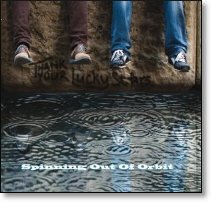 Thank Your Lucky Stars: Spinning Out of Orbit (Sounds Deevine
'12)
Thank Your Lucky Stars: Spinning Out of Orbit (Sounds Deevine
'12)
In which an obscurity named Ben Barnes who probably doesn't want the
press to know his age or how he brings in the extra-musical funds I'm
sure he needs offers an object lesson in how to pull a lot of ass by
projecting a sly, dirty sweetness, and in how to write striking songs
about pulling a lot of ass by adding tunes to his winsome tales and
come-ons. The catchiest of all is called "Suicide Notes as Love
Notes," and is preceded by one called "Dr. Nuegurl" that begins
"Dr. Nuegurl looks at me and says/That's what you get for fucking a
20-year-old." The finale is called "Happily Ever After," and I hope
for the sake of whichever woman he's singing it to that he means
it. For his sake too, actually. He is kind of attractive.
B PLUS [RC]
 Tin Men: Avocado Woo Woo (Threadhead Records)
Tin Men: Avocado Woo Woo (Threadhead Records)
More than any other American city, New Orleans has bands outsiders
never heard of. That's because so many players make a living without
having to go on tour (much). The three members of the Tin Men play in
about 10 other bands, but they rightly claim to be "America's finest
sousaphone, washboard and guitar trio." The sousaphone is Matt
Perrine, who also does trombone and sings, the washboard is Chaz
"Washboard" Leary, who adds percussion and vocal and the guitar is
Alex McMurray, who is also primary singer and songwriter. I discovered
their third album, Avocado Woo Woo on a recent visit to the Louisiana
Music Factory store and there's a lot going on here, all of it very
NOLA. First there's a quality of make-it-up as you go along and
anything-goes. Tin Men have done covers of Led Zeppelin, Sun Ra and on
Avocado Woo Woo, Stevie Wonder's "Signed, Sealed, Delivered I'm
Yours." McMurray's original songs, though, are the prize. He manages
to be funny-sarcastic and compassionate at the same time as well as,
uh, swampland peculiar. For example, "Jesus Always Gets His Man" is a
sort of Savior-as-PI tale. My favorite though, is "If You Can't Make
It Here," a lopsided sea shanty that is yet another inside-out tribute
to the city of New Orleans. The Tin Men have two previous releases
that show both admirable consistency and improvement.
A MINUS [MM]
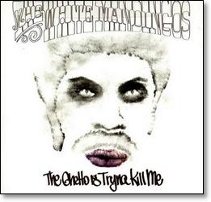 The White Mandingos: The Ghetto Is Tryna Kill Me (Fat Beats)
The White Mandingos: The Ghetto Is Tryna Kill Me (Fat Beats)
Not without flaws; some tactical, as in the clunky raps where Murs
defends his Caucasian speech patterns or advocates not listening with
your ears, as in the totally unnecessary "No Homo" aside; some
strategic, as in the plot line that wavers between invisible and
confusing -- after four good to excellent tracks that describe
individual women, in ascending order the comically accurate pair of "I
Don't Understand"/"My First White Girl," the rocking "Wifey" that
mixes Courtney Love and Lil' Kim, and the empathetic street-wise
"Black Girl Toof" the narrator ends up on Rap of the Year challenger,
"I Like You," with two babies absent clues as to whether the moms are
any of the previous four or somebody else. But take two steps back and
give the journalist, the hardcore punk veteran and the established
rapper some room to move around in the stories and know that at least
some of the confusion lies in the real time complications that young
life brings. Neither black nor white, but multiple shades of only
occasionally pornographic grey, these characters bring solutions to
the problems they face head on. By the end, with neither embarrassment
nor defensiveness, two lesbian wives, one straight husband, and two
kids become a single nuclear family. And once you hear the beyond-Roe
v. Wade last line of "I Like You," you will never forget it. Plus, the
music hits that punk/rap sweet spot we've wanted for two decades
now. Track 8, the one called "My Weapon," is an instrumental
joke. Hallelujah!
A MINUS [GM]
Contributors
Thanks to all the contributors, listed below.
- Robert Christgau [RC]
will be the Dean of American Rock Critics until the day he dies.
(Just kidding.)
- Francis Davis [FD]
is the author of seven books, a former columnist for the Village
Voice and former Contributing Editor of The Atlantic, and a
2008 Grammy winner for his liner notes. He conducts an annual Jazz
Critics Poll, which will be hosted this year by NPR Music.
- Lucas Fagen [LF]
writes regularly for
Hyperallergic Weekend.
- Tom Hull [TH]:
Has written in the Village Voice and Seattle Weekly, but these days
just rants about politics and rates music
On the Web.
- Brad Luen [BL]
is a lecturer in statistics at Indiana University.
- Jeffrey Melnick [JM]:
Has written often about the history of American popular culture,
most recently in his book 9/11 Culture: America Under Construction.
- Milo Miles [MM]:
Milo Miles wants to flog his new blog this year:
Miles To Go.
- Chris Monsen [CM]:
Freelance writer and regular contributor to Musikkmagasinet in
the Norwegian daily Klassekampen. Blogs at
perfectsounds.blogspot.com.
- Greg Morton [GM]:
Record critic, Oregon State University Barometer, decades ago.
More recently, retired state gov't middle manager.
- Matt Rice [MR]:
Writes the
Matt on Music column for the Eastern Echo.
|
